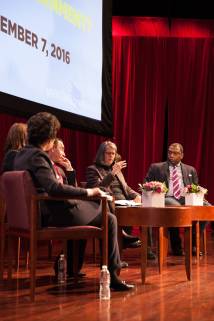NYU Wagner panel sees "stress test for democracy" as a result of 2016 election

Should students preparing for a career in public service be deterred by the seismic shift in political power the 2016 election produced?
Experts convened by NYU Wagner on Dec. 7 for a discussion of the 2016 election and its impact on government and public service responded with a resounding “No.”
“Don’t let this election cycle scare you off,” Basil Smikle, Executive Director of the NYS Democratic Party, told the audience of 300, including many NYU Wagner students. “That’s the best advice I can give you.”
Addressed by Sherry Glied, the Dean of the school, the panelists consisted of Susan Del Percio, Republican strategist; Tim Naftali, Clinical Associate Professor of Public Service and CNN Presidential Historian; Eleanor Randolph, Visiting Faculty and former New York Times Editorial Board member, as well as Mr. Smikle.
While surprised by the dramatic change in the balance of power, the experts pointed to some positive outcomes. These included the President-elect’s affinity for New York and many of the state’s elected officials; the heightened importance of Federal agencies' hiring skilled and effective managers to support sometimes-inexperienced Cabinet appointees; and expectations that President-elect Donald Trump will react to, rather than seek to ignore, street demonstrations and social-media posts concerning his policies.
Staying involved and engaged in the political process and public service careers is perhaps more important than it has ever been before, the panelists asserted.
“If you see something, say something,” Professor Naftali advised, adding, “Tweet about it, talk about it. In this environment, that’s the way to protect our civil liberties.”
“There are really good people in Albany, in the State Senate and the Assembly, there are good people in City Council,” said Ms. Randolph. “And the thing is, if really energetic, smart young people do not run for these offices, that means someone else is going to run – and you don’t really want some of those people to go to Albany, you don’t want them to take over the City Council. I’d much rather have some of you, for example, take on the really complicated issues of the City and of the State.”
“And it’s useful too, isn’t it,” interjected Professor Naftali, “not just to write opinion pieces, but to actually participate in a campaign. You may not want to run for office, but it’s still worthwhile to participate.”
He predicted the U.S. system will pass what he called a “stress test for democracy” in the coming years.
“Here’s one thing that’s a positive,” offered Ms. Del Percio. “At least the President is from New York. The things the Mayor and Governor ask for will be very recognizable to this administration...He (Trump) has also had a very good relationship with Congressman Chuck Schumer over the years; he knows how to relate to the folks from New York.”
Citing Trump campaign pronouncements that many citizens found frightening, Ms. Del Percio expressed a caveat. “As for the policies, I’d be very concerned,” she said. “I’m concerned, and I’m a Republican.”